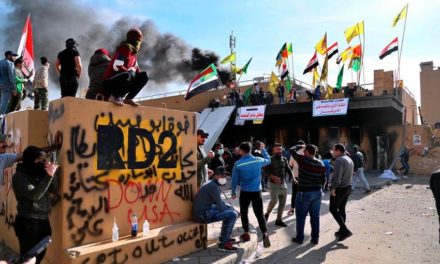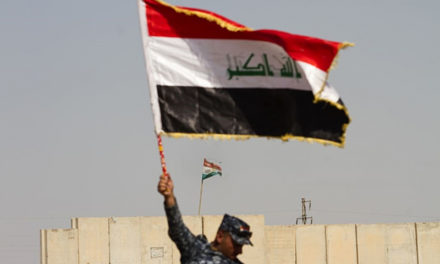Iraq has been facing a series of crises for the last several months. Due to the leadership vacuum it has been plagued with since Adil Abd Al-Mahdi assumed office in October 2018, this is likely to worsen on several scales and culminate into a perfect storm that will drive the country to the brink.
Social Crisis
The youth protests that started on 1 October 2019 and engulfed Baghdad and Iraq’s nine southern provinces started for several reasons. They boil down to a clash between the “haves” and the “have-nots”. Picture the convoys of armoured SUVs ferrying politicians and officials versus the now infamous tuk-tuks, the method of transportation for those who cannot afford a taxi, let alone their own vehicle. The social upheaval has paralysed several cities, prevented tens of thousands of Iraqi children from attending school and led to the resignation of the government.
Despite the promises of reform, the draft pieces of legislation sitting on the desks of parliamentarians and the continuous hiring of Iraqi public sector employees, the protests have not declined. The youth are crying out that they “want a homeland” which seems odd unless you interpret it to mean “hope”. This is sorely missing from average Iraqis, whether young or old due to the lack of vision provided by Abd Al-Mahdi and his lacklustre cabinet.
Political Crisis
The social upheaval led Iraq’s Grand Ayatollah Ali Al-Sistani to give a sermon (through a representative) on 29 November 2019 calling on the Government of Iraq to resign. The same day, Abd Al-Mahdi wrote to the Iraqi Council of Representatives informing them that he is resigning. Abd Al-Mahdi also asked his cabinet to discharge their duties until replacement ministers take over their portfolios. Due to political wrangling and then the killing of Qods Force Commander Major General Qassim Soleimani and Public Mobilization Forces (PMF) Deputy Abu Mahdi Al-Muhandis, in an American airstrike just outside Baghdad International Airport, the process to replace Abd Al-Mahdi was severely delayed.
An agreement was made between the leaders of the Fateh and Sairoon Alliances. Hadi Al-Ameri and Muqtada Al-Sadr would push the candidacy of Mohammed Tawfik Allawi as a new face to the existing political equation which emerged as a result of the 2018 election which made the two men kingmakers. On 1 February 2020 President Barham Salih nominated Allawi to form a new government within thirty days.
Allawi was given mission impossible: appease the protestors trying to bring the political system down and also woo the parliamentarians that make up the system so they vote for him, his government programme and his cabinet. After a month of preparation and horse-trading, Allawi went to parliament on 27 February only to be shunned by a majority of parliamentarians who boycotted the parliamentary session in order to avoid a vote on his candidacy. On 1 March Allawi went to parliament again and once again the majority of MPs boycotted the session. Later that night, Allawi withdrew his nomination.
While Iraq’s politicians are back to square one, resigned Prime Minister Abd Al-Mahdi confirmed his stance that it is wrong that he remains as acting prime minister after resigning in November. With the acting prime minister shirking responsibility and no replacement in sight, Iraq could be a ship without a captain in the coming days. While Iraq has a president, his ceremonial position is not to head the executive branch of government. Also, Salih will now be preoccupied with replacing Allawi as the constitution provides him the ability to choose a candidate without reverting back to the largest bloc in parliament. All eyes will be on Salih as the success or failure of the new candidate will be on his shoulders in the same way that Allawi’s failure is on the shoulders of Sadr and Ameri.
Economic Crisis
As we enter the third month of 2020, Iraq has yet to pass the federal budget law for this financial year. This means that the Government of Iraq can only cover operational expenses such as salaries as it does not have the legal basis to spend on investment projects. With the government being the biggest player in Iraq’s economy, rather than the private sector, we could see an economic slowdown in the coming months, if not weeks.
With oil revenues making up nearly ninety percent of Iraq’s budget, the recent decline in oil prices are concerning, to say the least. This last week Brent Crude traded below $50. Iraq’s oil revenues are based on the cost of Brent Crude minus the cost of extraction, which varies from oilfield to oilfield and also the quality of the oil. Thus Iraq makes $3-7 below Brent Crude. This means that Iraq is making $42-46 per barrel of oil. At production rates of 4.16 million barrels per day, Iraq will earn $5.2 billion to $5.7 billion per month which is barely enough to cover the costs of the salaries of the public sector employees. If the price of oil continues to fall, as is expected due to the coronavirus epidemic, then the government will only be able to meet its commitment to public sector employees but not finance its debts or meet other financial obligations.
The Perfect Storm
The continued protests, coupled with the lack of leadership and the looming economic crisis make for a perfect storm in Iraq as it approaches the searing heat of its summers. The political elite need to think about the next four to six months and work towards solutions to the above-mentioned problems. Otherwise they could see themselves as the former political elite of the country as Iraq descends into further instability and greater chaos.

Alaa Kadhem
Alaa Kadhem is a lawyer and leadership consultant with experience in the Middle East.










